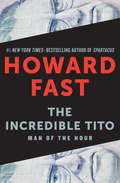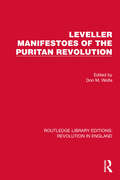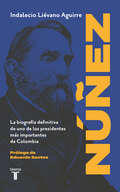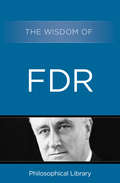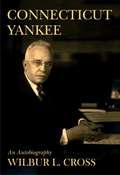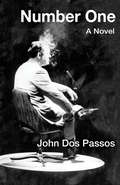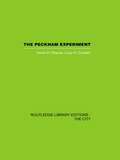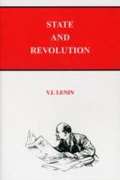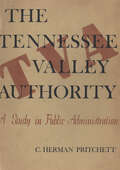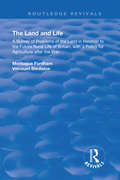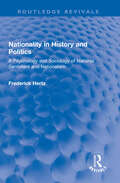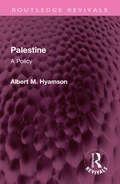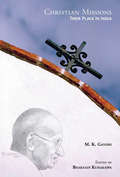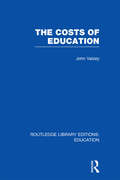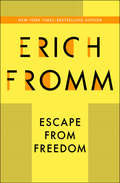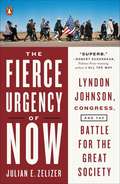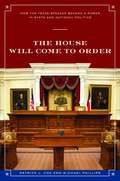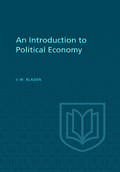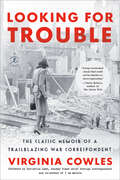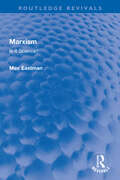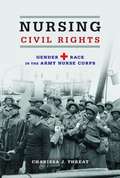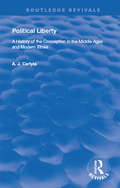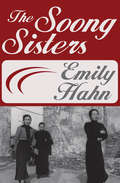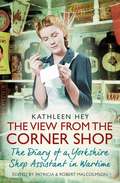- Table View
- List View
The Incredible Tito: Man of the Hour
by Howard FastFast&’s fascinating biography of Joseph Broz, known to the world as Tito, including his rise to power and his remarkable stand against fascismThe world was mired in the Second World War when Howard Fast wrote The Incredible Tito. Upon the book&’s publication in 1944, there was still no united Yugoslavia, the Axis controlled most of Europe, and D-Day was only in the planning stages. In the Balkans, Tito was a beacon of hope against the advancing Nazis. He led a force of resistance fighters that bedeviled the occupying German army throughout Slavic regions and empowered people&’s committees to act as local government in all liberated areas. For observers on the political left, Tito seemed uniquely poised to unite the East and West against fascism—once and for all. This ebook features an illustrated biography of Howard Fast including rare photos from the author&’s estate.
Leveller Manifestoes of the Puritan Revolution (Routledge Library Editions: Revolution in England #6)
by Don M. WolfeLeveller Manifestoes (1944) is a collection of primary manifestoes issued by the Levellers, the group which played an active and influential role in the English revolution of 1642–49. This book collects together rare pamphlets and tracts that are seldom available, and certainly not in one place for ease of research.
Rafael Núñez: La biografía definitiva de uno de los presidentes más importantes de colombia
by Indalecio Liévano AguirreLa biografía más completa del presidente Rafael Núñez "Muchas veces se ha querido juzgar al poeta con criterio meramente retórico, cuando la verdad es que en Núñez el poeta, el hombre privado y el hombre público están indisolublemente ligados .Así lo comprendió Liévano Aguirre y ese, para mí, es el mejor acierto literario y psicológico de su obra. Con certero instinto vio dónde estaba la mejor clave de interpretación de la personalidad del doctor Núñez y nos presenta en su biografía una figura profundamente humana, alimentada siempre por fuertes e implacables pasiones, por un cálido sentido de la vida, por rencores, venganzas, ambiciones y sensualidades que ejercían influjo decisivo sobre lo que pudiera considerarse como mera orientación política. La fría enumeración de las actividades públicas de Núñez y de la manera como ellas modificaron la vida colombiana no podría jamás explicarnos por sí sola la personalidad del padre de la Regeneración. Se equivocan, a mi modo de ver, quienes quisieran ver en él tan solo a un doctrinario, a un pensador político, a un organizador de las instituciones. Podría ser todo eso pero era además una pasión en marcha, una pasión humana, influida decisivamente por todas las cosas grandes y pequeñas que afectan la vida de los hombres". Eduardo Santos
The Wisdom of FDR (Wisdom)
by The Wisdom SeriesHow a great American president communicated a changing worldview What made Franklin Delano Roosevelt an effective leader? His policies and decisions changed our nation&’s and the world&’s history. But more than his skill as a savvy politician and progressive thinker, FDR&’s ability to directly and eloquently voice his thoughts on national concerns, social change, and humanity spoke to and reached the hearts of his people. In this selection of quotes drawn from his speeches and papers, FDR&’s observations and opinions cover everything from faith, war, and peace, to religion, freedom, and the very definition of what it is to be an American. Essays include &“The Four Freedoms,&” &“We Belong to Many Races,&” &“True Education,&” &“The Rights of the Common Man,&” &“Dynamic Democracy,&” and &“Government with a Soul.&”
Connecticut Yankee: An Autobiography
by Wilbur L. CrossEqual parts nostalgic, witty, self-serving, and frank, Connecticut Yankee is an entertaining and informative memoir of the state and a scholar who shaped it. Connecticut native, Yale graduate, Yale professor and dean, and finally, unlikely Governor of the State of Connecticut during the crucial Depression years, Wilbur L. Cross’ s autobiography tells a great American story.As a Yale professor, a writer, and an editor, Wilbur L. Cross devoted himself to the English language, and specifically to understanding how novels were capable of capturing the human condition. His autobiography, Connecticut Yankee is in many ways a novel itself. The protagonist is Cross and the plot is his education. Wilbur Lucius Cross was a most unlikely politician. A noted author and literary critic who had been a professor of English, editor of the Yale Review, and finally, Dean of the Yale Graduate School, his quiet character and almost poetic oration would seem at odds with the cut-throat world of state politics. But is was just this stoic demeanor and inquisitive intelligence, that would help him make a mark on Connecticut politics during his four terms of office, from 1931 to 1939. During his time as governor, he suffered the hardest years of the Depression and worked to implement President Roosevelt’s New Deal, fought for the abolition of child labor, instituted a minimum wage, improved working conditions in factories, and guided the state’s recovery from the devastation of the Great New England Hurricane. He also strove to reorganize the state government, and would help revitalize Connecticut’s Democratic Party, which had been torn by internal strife. Cross was an excellent writer, and here—updated with a new foreword by Yale Law School graduate and author Justin Zaremby—is his compelling account of life from a childhood in the bucolic town of Mansfield, through the hallowed halls of learning at Yale University, to the highest office in Connecticut.
Number One
by John Dos PassosTyler Spotswood, an alcoholic campaign manager, helps elect a corrupt Southern politician to the U.S. Senate. When his boss, Chuck Crawford aka "Number One," pins a scandal on Spotswood, Tyler is too drunk to blow the whistle. Number One draws many comparisons to Robert Penn Warren's All the King's Men. Crawford reminds many of Louisiana politician Huey Long, a figure studied in person by Dos Passos.
The Peckham Experiment: A study of the living structure of society
by Innes H. Pearse Lucy H. CrockerFirst published in 2006. Routledge is an imprint of Taylor & Francis, an informa company.
State and Revolution
by V. I. LeninWritten in 1917 and unfinished because the writing was interrupted by the October revolution, Russian revolutionary Vladimir I. Lenin explains the nature of the state and how and under what circumstances it can be abolished. It is a polemic against the Social Democrats, Mensheviks and anarchists of the time.
The Tennessee Valley Authority: A Study in Public Administration
by C. Herman PritchettAs an example of the efficient administration of a vast public enterprise, the T.V.A. furnished a basis for renewed faith in democratic institutions and for hope in the reconstruction of a war-torn world. The author discusses the background of the T.V.A., its multiple-purpose program, its development as one of the greatest power agencies in the world, its contribution to the war effort, and its ultimate meaning and significance.Originally published in 1943.A UNC Press Enduring Edition -- UNC Press Enduring Editions use the latest in digital technology to make available again books from our distinguished backlist that were previously out of print. These editions are published unaltered from the original, and are presented in affordable paperback formats, bringing readers both historical and cultural value.
The Land and Life: An Analysis of Problems of the Land in Relation to the Future of English Rural Life with a Policy for Agriculture After the War (Routledge Revivals)
by Montague FordhamOriginally published in 1942, the Rural Reconstruction Association had been working on the rural problem in its various aspects for several years. This republished volume represented the conclusions reached in the face of the urgent problems of war and reconstruction, and outlines a policy based on the widest interests of the nation as a whole. The book contains chapters on policy in the past and present, the post-war policy, and the opposition and support to the policies outlined.
Nationality in History and Politics: A Psychology and Sociology of National Sentiment and Nationalism (Routledge Revivals)
by Frederick HertzFirst published in 1944, Nationality in History and Politics unpacks the vagueness of terms such as nationality, national consciousness, national character, national will, national self-determination, etc. The phenomena underlying these terms are exceedingly complex, and writers frequently shift the sense according to the interest defended. National consciousness comprises a number of different aspirations which, however, can be summed up as a striving for national personality. The book investigates in detail the correlations between those aspirations and such factors as race, language, religion, territory and State, and examines in particular the social background of modern nationalism. The chapters give the sociology of national sentiment and national traditions, usually called national character, against a wide historical background. The latter part of the book treats the evolution of ideas on nationality and on supranational aims from the Middle Ages to our own time, and the influence of the doctrines of great thinkers on the national ideology of the principal nations. This book will be of interest to students of history, political science, sociology and psychology.
Palestine: A Policy (Routledge Revivals)
by Albert M. HyamsonFirst published in 1942, Palestine is a brief history of Zionism, interspersed with a wealth of observation stimulation for the seeker of objective truth. The author develops his own theories of Jewish racialism, nationalism and colonization, and elaborates on the role of Britain with respect to Zionism in Palestine. He also expands on the binary of a spiritual Zionism and a territorial neo-Zionism stating that former believed in peaceful coexistence with the Arab population in Palestine, while the latter is only invested in aggressive nationalism. The language used is a reflection of its era and no offence is meant by the Publishers to any reader by this republication. This book will be of interest to students of history, political science, international relations and geography.
Catherine of Aragon
by Garrett MattinglyBiography about Henry VIII's first wife, the Spanish princess Catherine of Aragon
Christian Missions: Their Place in India
by M. K. GandhiI hold that it is the duty of every cultured man or woman to read sympathetically the scriptures of the world. If we are to respect others’ religions as we would have them to respect our own, a friendly study of the world’s religions is a sacred duty. We need not dread, upon our grown up children, the influence of scriptures other than our own. We liberalize their outlook upon life by encouraging them to study freely all that is clean. Fear there would be when someone reads his own scriptures to young people with intention secretly or openly of converting them. He must then be biassed in favour of his own scriptures. …My respectful study of other religions has not abated my reverence for or my faith in the Hindu scriptures. They have indeed left their deep mark upon my understanding of the Hindu scriptures. They have broadened my view of life. They have enabled me to understand more clearly many an obscure passage in the Hindu scriptures.— By Gandhiji
The Costs of Education (Routledge Library Editions: Education)
by John VaizeyThis is the first book which authoritatively reviews the UK expenditure on education from 1920 – 1955, both by local authorities and private schools. The book takes the main elements of education in turn and discusses them in detail. There are original studies of local authority finance, of teachers’ pay and of the economics of private education. It examines educational spending by social class and compares the growth of educational services in England and Wales, Scotland and Northern Ireland.
Escape from Freedom: Escape From Freedom, To Have Or To Be?, And The Anatomy Of Human Destructiveness
by Erich FrommWhy do people choose authoritarianism over freedom? The classic study of the psychological appeal of fascism by a New York Times–bestselling author. The pursuit of freedom has indelibly marked Western culture since Renaissance humanism and Protestantism began the fight for individualism and self-determination. This freedom, however, can make people feel unmoored, and is often accompanied by feelings of isolation, fear, and the loss of self, all leading to a desire for authoritarianism, conformity, or destructiveness. It is not only the question of freedom that makes Fromm&’s debut book a timeless classic. In this examination of the roots of Nazism and fascism in Europe, Fromm also explains how economic and social constraints can also lead to authoritarianism. By the author of The Sane Society and The Anatomy of Human Destructiveness, this is a fascinating examination of the anxiety that underlies our darkest impulses, an enlightening volume perfect for readers of Eric Hoffer or Hannah Arendt. This ebook features an illustrated biography of Erich Fromm including rare images and never-before-seen documents from the author&’s estate.
The Fierce Urgency of Now
by Julian E. ZelizerA majestic big-picture account of the Great Society and the forces that shaped it, from Lyndon Johnson and members of Congress to the civil rights movement and the mediaBetween November 1963, when he became president, and November 1966, when his party was routed in the midterm elections, Lyndon Johnson spearheaded the most transformative agenda in American political history since the New Deal, one whose ambition and achievement have had no parallel since. In just three years, Johnson drove the passage of the Civil Rights and Voting Rights Acts; the War on Poverty program; Medicare and Medicaid; the National Endowments for the Arts and the Humanities; Public Broadcasting; immigration liberalization; a raft of consumer and environmental protection acts; and major federal investments in public transportation. Collectively, this group of achievements was labeled by Johnson and his team the "Great Society."In The Fierce Urgency of Now, Julian E. Zelizer takes the full measure of the entire story in all its epic sweep. Before Johnson, Kennedy tried and failed to achieve many of these advances. Our practiced understanding is that this was an unprecedented "liberal hour" in America, a moment, after Kennedy's death, when the seas parted and Johnson could simply stroll through to victory. As Zelizer shows, this view is off-base: In many respects America was even more conservative than it seems now, and Johnson's legislative program faced bitter resistance. The Fierce Urgency of Now animates the full spectrum of forces at play during these turbulent years, including religious groups, the media, conservative and liberal political action groups, unions, and civil rights activists.Above all, the great character in the book whose role rivals Johnson's is Congress--indeed, Zelizer argues that our understanding of the Great Society program is too Johnson-centric. He discusses why Congress was so receptive to passing these ideas in a remarkably short span of time and how the election of 1964 and burgeoning civil rights movement transformed conditions on Capitol Hill. Zelizer brings a deep, intimate knowledge of the institution to bear on his story: The book is a master class in American political grand strategy.Finally, Zelizer reckons with the legacy of the Great Society. Though our politics have changed, the heart of the Great Society legislation remains intact fifty years later. In fact, he argues, the Great Society shifted the American political center of gravity--and our social landscape--decisively to the left in many crucial respects. In a very real sense, we are living today in the country that Johnson and his Congress made.
The House Will Come to Order
by Patrick L. Cox Michael PhillipsIn a state assumed to have a constitutionally weak governor, the Speaker of the Texas House wields enormous power, with the ability to almost single-handedly dictate the legislative agenda. The House Will Come to Order charts the evolution of the Speaker’s role from a relatively obscure office to one of the most powerful in the state. This fascinating account, drawn from the Briscoe Center’s oral history project on the former Speakers, is the story of transition, modernization, and power struggles. Weaving a compelling story of scandal, service, and opportunity, Patrick Cox and Michael Phillips describe the divisions within the traditional Democratic Party, the ascendance of Republicans, and how Texas business, agriculture, and media shaped perceptions of officeholders. While the governor and lieutenant governor wielded their power, the authors show how the modern Texas House Speaker built an office of equal power as the state became more complex and diverse. The authors also explore how race, class, and gender affected this transition as they explain the importance of the office in Texas and the impact the state’s Speakers have had on national politics. At the apex of its power, the Texas House Speaker’s role at last receives the critical consideration it deserves.
An Introduction to Political Economy
by Vincent BladenNewly revised by the author (1956), this text-book for beginning students is also designed for general readers who want to know what economics is and how economists think. It analyses the size and composition of the wage-earner in modern industry, Canadian public policy in relation to combines, and the the social problems of the special problems of the Canadian wheat-growing and newsprint industries. "...an interesting, instructive, and valuable book full of essential information."
Looking for Trouble: The Classic Memoir of a Trailblazing War Correspondent
by Virginia CowlesThe rediscovered memoir of an American gossip columnist turned &“amazingly brilliant reporter&” (The New York Times Book Review) as she reports from the frontlines of the Spanish Civil War and World War II&“A long-overlooked classic that could not be timelier or more engrossing.&”—Paula McLain, author of The Paris WifeForeword by Christina Lamb, Sunday Times chief foreign correspondent and co-author of I Am Malala Virginia Cowles was just twenty-seven years old when she decided to transform herself from a society columnist into a foreign press correspondent. Looking for Trouble is the story of this evolution, as Cowles reports from both sides of the Spanish Civil War, London on the first day of the Blitz, Nazi-run Munich, and Finland&’s bitter, bloody resistance to the Russian invasion. Along the way, Cowles also meets Adolf Hitler (&“an inconspicuous little man&”), Benito Mussolini, Winston Churchill, Martha Gellhorn, and Ernest Hemingway. Her reportage blends sharp political analysis with a gossip columnist&’s chatty approachability and a novelist&’s empathy. Cowles understood in 1937—long before even the average politician—that Fascism in Europe was a threat to democracy everywhere. Her insights on extremism are as piercing and relevant today as they were eighty years ago.
Marxism: Is it Science? (Routledge Revivals)
by Max EastmanFirst published in 1941, Marxism: Is it Science? was written to present the author’s criticisms of Marxism and, in doing so, to further exemplify his ‘Method of Instruction’ first proposed in an earlier work. The book is divided into six parts to provide six complete presentations of Marxism and why the author considers it unscientific. The six different approaches, varying in focus and complexity, work together to give the reader a detailed overview of Marxism and the authors critique of it.
Nursing Civil Rights: Gender and Race in the Army Nurse Corps (Women, Gender, and Sexuality in American History)
by Charissa J. ThreatIn Nursing Civil Rights, Charissa J. Threat investigates the parallel battles against occupational segregation by African American women and white men in the U.S. Army. As Threat reveals, both groups viewed their circumstances with the Army Nurse Corps as a civil rights matter. Each conducted separate integration campaigns to end the discrimination they suffered. Yet their stories defy the narrative that civil rights struggles inevitably arced toward social justice. Threat tells how progressive elements in the campaigns did indeed break down barriers in both military and civilian nursing. At the same time, she follows conservative threads to portray how some of the women who succeeded as agents of change became defenders of exclusionary practices when men sought military nursing careers. The ironic result was a struggle that simultaneously confronted and reaffirmed the social hierarchies that nurtured discrimination.
Political Liberty: A History of the Conception in the Middle Ages and Modern Times (Routledge Revivals)
by A. J. CarlyleOriginally published in 1988, this book explores the history of political liberty. There is an opinion that the conception of Political Liberty, however important it may have been in Athens and Republican Rome, disappeared in the period of the Roman Empire and in the Middle Ages, and has only been recovered in the last two centuries. This work is primarily an attempt to set out the continuity of the development of the conception of Political Liberty during the Middle Ages and the seventeenth and eighteenth centuries - the development, but even more, the continuity of development, for this has been inadequately appreciated in the past.
The Soong Sisters
by Emily Hahn&“If the story of the Soong family were told as fiction, people would say it was fascinating but too improbable. . . . A dramatic human chronicle . . . engrossing.&” —The New York Times Book Review In the early twentieth century, few women in China were to prove so important to the rise of Chinese nationalism and liberation from tradition as the three extraordinary Soong sisters—Eling, Chingling and Mayling—who would each marry historic figures. Told with wit and verve by New Yorker correspondent Emily Hahn, a remarkable woman in her own right, the biography of the Soong sisters reveals the story of China through both World Wars. It also chronicles the changes to Shanghai as they relate to a very eccentric family that had the courage to speak out against the ruling regime. Greatly influencing the history of modern China, they interacted with their government and military to protect the lives of those who could not be heard, and appealed to the West to support China during the Japanese invasion. &“[A] first-rate reportorial job on three distinguished women.&” —Kirkus Reviews &“A spirited, well-informed book . . . a fascinating saga . . . Hahn skillfully interweaves the personal material which she has collected in abundance with some indispensable background knowledge of Chinese history.&” —The Atlantic
The View From the Corner Shop: The Diary of a Yorkshire Shop Assistant in Wartime
by Kathleen HeyKathleen Hey spent the war years helping her sister and brother-in-law run a grocery shop in the Yorkshire town of Dewsbury. From July 1941 to July 1946 she kept a diary for the Mass-Observation project, recording the thoughts and concerns of the people who used the shop. What makes Kathleen's account such a vivid and compelling read is the immediacy of her writing. People were pulling together on the surface ('Bert has painted the V-sign on the shop door…', she writes) but there are plenty of tensions underneath. The shortage of food and the extreme difficulty of obtaining it is a constant thread, which dominates conversation in the town, more so even than the danger of bombardment and the war itself. Sometimes events take a comic turn. A lack of onions provokes outrage among her customers, and Kathleen writes, 'I believe they think we have secret onion orgies at night and use them all up. ' The Brooke Bond tea rep complains that tea need not be rationed at all if supply ships were not filled with 'useless goods' such as Corn Flakes, and there is a long-running saga about the non-arrival of Smedley's peas. Among the chorus of voices she brings us, Kathleen herself shines through as a strong and engaging woman who refuses to give in to doubts or misery and who maintains her keen sense of humour even under the most trying conditions. A vibrant addition to our records of the Second World War, the power of her diary lies in its juxtaposition of the everyday and the extraordinary, the homely and the universal, small town life and the wartime upheavals of a nation.
